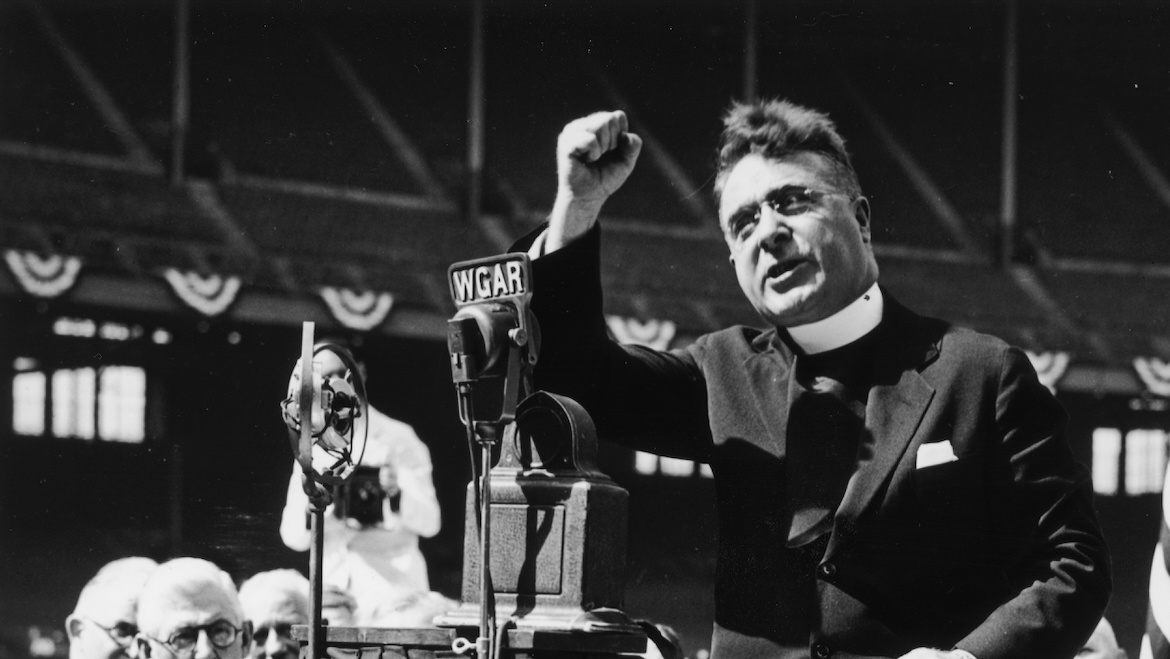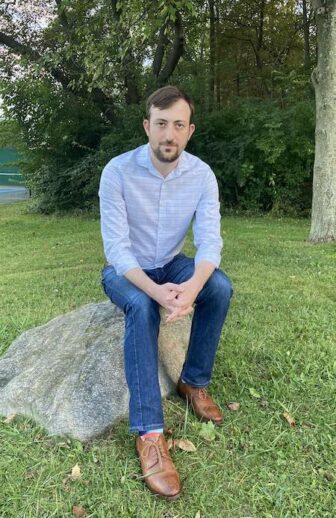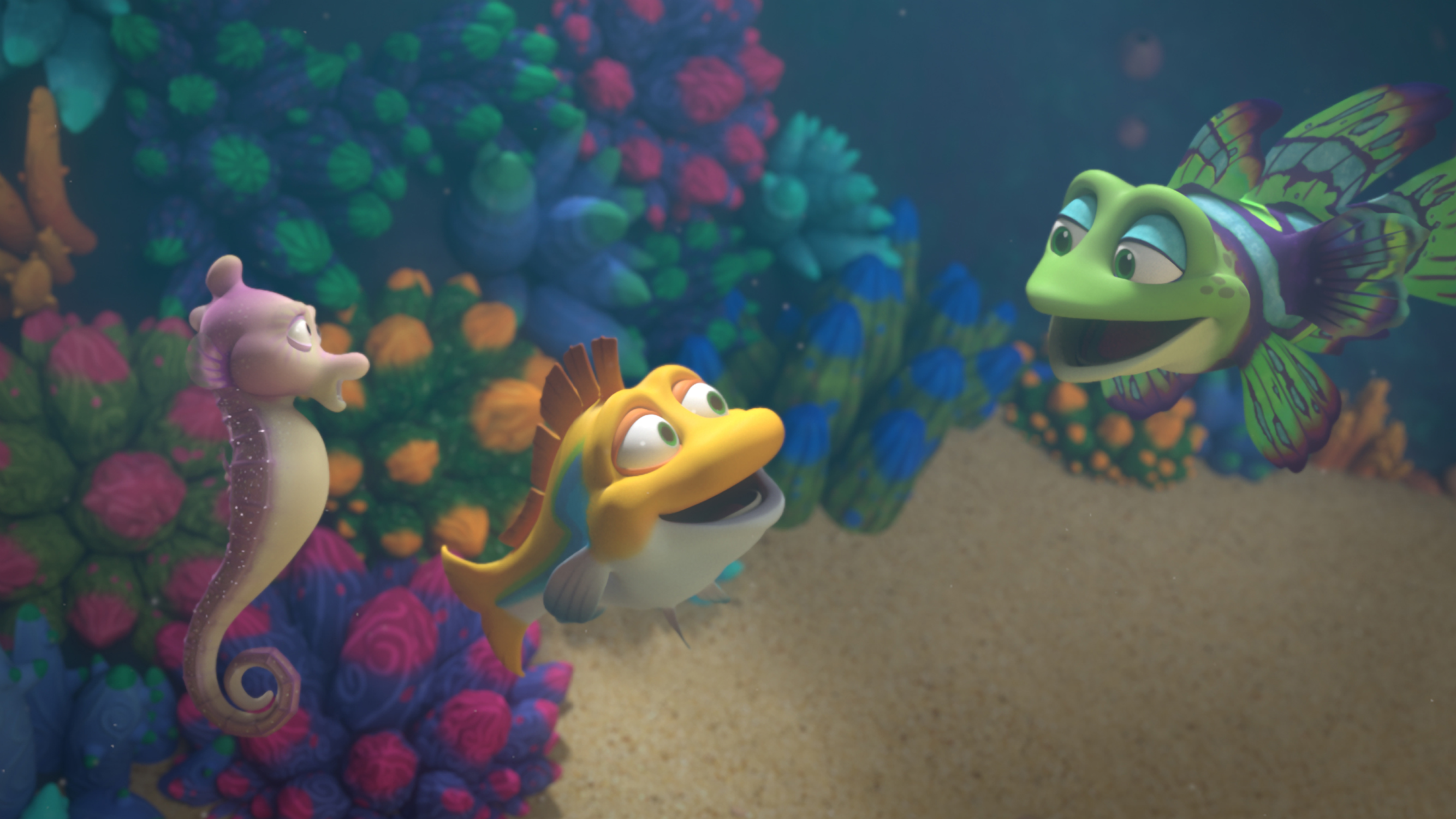WNET Group acquires podcast about antisemitic broadcaster Father Charles Coughlin

Fotosearch / Getty Images
Father Charles Coughlin delivers a radio speech, circa 1930s.
Andrew Lapin always hoped his podcast series about Father Charles Coughlin would have a home in public media. It now does, thanks to a unique collaboration with Tablet Studios and the WNET Group in New York City.
Lapin, a Detroit-based journalist and former Current reporter and freelance contributor, created the eight-part narrative podcast Radioactive about Coughlin’s life and his rise from an unknown Detroit priest to what Lapin describes as “America’s first mass media demagogue.”
Lapin was drawn to the story after growing up not far from the National Shrine of the Little Flower, Coughlin’s former church in the Detroit suburb of Royal Oak, Mich. Lapin recalled talking with his father about how Coughlin built the church and his following by spreading antisemitic messages on the radio.
“I just thought that was so wild,” Lapin said. “It was one of those moments that just peeled back the curtain on facets of America that you don’t often think about.”
He began working on the series in 2017 and produced a 10-minute pilot episode under the guidance of Bill Healy, a Chicago-based journalist who produces StoryCorps for WBEZ in Chicago. After Lapin shopped the pilot around for a few years, Tablet Studios, the podcast division of Tablet magazine, picked it up in 2020. Lapin began working with Tablet’s production team on its eight episodes — a process he describes as a “mad sprint.”

“I happened to reach out to them right as they were looking to expand their own podcast offerings,” Lapin said. “My concern initially was that I didn’t want this to really just be a Jewish show … but they were totally on the same page with me about that. We always marketed it as a history show, which I think has helped to find a good audience as well.”
The podcast launched in October 2021 and has received about 45,000 listener downloads since then, said Stephanie Butnick, Tablet’s deputy editor and manager of Tablet Studios.
One of those listeners was Judy Greenspan, director of multiplatform initiatives at WNET Group, the producing station behind PBS series such as Amanpour and Company and American Masters.
Greenspan found Radioactive while researching a story on Coughlin that she commissioned New York Times contributor Clyde Haberman to write for Exploring Hate, a multiplatform reporting initiative that explores the history of antisemitism, racism and extremism in the United States.
“I thought it was incredible the way the story was told and how things we’re seeing today are encapsulated in this man’s story,” Greenspan said.
Greenspan approached Butnick, whom she knew from her previous role at The Center for Jewish History, about acquiring Radioactive for Exploring Hate in December 2021.
Exploring Hate began featuring the podcast on its homepage March 9 and published all eight episodes from the series along with transcripts and a study guide. As of March 15, the series had received 2,200 new downloads, including 700 of its first episode, Butnick said.
With WNET’s acquisition, Tablet created an email and social media marketing campaign to remind its audience about Radioactive. The promotions announced the partnership and directed people to the podcast.
Butnick said she was thrilled at the opportunity to partner with public media and help Radioactive reach an even bigger audience. “For us, it’s a stamp of approval, and it’s a big credit and validation of the work we did on the show,” she said. “We would much prefer a production partnership like this one, where it feels mission-aligned. It feels like we’re working with a partner who really cares.”
WNET paid Tablet Studios an acquisition fee for the series, which helped offset the production costs of recording new intro and outro segments for each episode to identify the show as a production of Tablet Studios and WNET Group’s Exploring Hate initiative, Butnick said.
The deal also funded creation of the study guides, which Lapin wrote for each episode. WNET is exploring collaborations with teachers to get the podcast into classrooms, Greenspan said.
Acquisitions are not new for WNET, which frequently acquires documentaries and streaming video series for its initiatives like Exploring Hate, Greenspan said. Podcasts, however, are newer for the organization.
“Everyone listens to podcasts now, and they were on my wish list when I started this role,” said Greenspan, who joined WNET in May 2021. “We’ve been talking about producing an original podcast, and it’s something I think we should be offering.” Her plans include developing new podcasts for “Exploring Hate” while also acquiring shows from outside producers.
Lapin recorded his narration for Radioactive at Michigan Radio and WDET. Public media was very much in his mind when he was writing scripts and assembling archival audio, he said.
“I always wanted it to be like a public media project,” Lapin said. “It was very much in line with all those public radio podcasts that I was listening to and where my inspiration was coming from.”
Tablet Studios also is open to partnering with public media stations to produce content that aligns with Tablet’s mission and audience, Butnick said.
“We want to have smart conversations about things that are relevant to a Jewish audience,” Butnick said. “We know we have the editorial chops, and partnerships like these let us amplify the work to a new audience.”
Correction: An earlier version of this story erroneously reported that Greenspan plans to develop new podcasts for WNET. She makes editorial decisions for “Exploring Hate,” not the entire station group.






